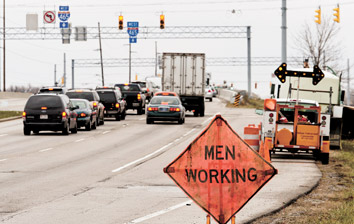Subscriber Benefit
As a subscriber you can listen to articles at work, in the car, or while you work out. Subscribe NowIt appears all funding options are on the table as budget heads and other lawmakers on Wednesday called on the Indiana General Assembly to boost transportation infrastructure investment at the state and local levels.
The two-year panel—the Funding Indiana’s Roads for a Stronger, Safer Tomorrow Task Force (FIRSST)—was authorized to tackle Indiana’s impending multi-billion-dollar road and bridge shortfalls.
“If we don’t take care of what we currently have, it’s a form of debt, and I’m not one that just loves debt,” said task force co-Chair Rep. Jeff Thompson. “… If we do nothing, we’re borrowing and putting burden on future taxpayers. And so I—we must do this. It’s hard decisions, but it’s the best thing long-term for our state.”
Co-Chair Sen. Ryan Mishler concurred, saying, “I think we’ve done a good job managing our money, but with inflation increasing the cost, we just can’t keep up. So if we want to keep up, we have to do something.”
The two men lead their respective chambers’ powerful budget-building committees, which are critical stops for bills with fiscal impacts.
In a final report—adopted by consent, without any changes—the task force found that Indiana’s road and bridge network is critical to the state’s economic success, and that improvements to it are “necessary and appropriate” costs. Those expenses, per the report, should be paid by those that benefit from the network, “in proportion to their use.”
First, the task force recommended that lawmakers increase investment in state and local transportation infrastructure. It didn’t specify a mechanism.
In a July revenue study presented at the task force’s August meeting, INDOT suggested increasing existing transportation fees and taxes, tying registration fees to vehicle age or fuel efficiency, directing some electric and hybrid vehicle fees away from the Community Crossings Matching Grant program, adding road usage fees, tolling more roads and bridges, taxing electric vehicle charging, and several more strategies. The agency previously said it faces a fiscal cliff if funding changes aren’t made.
The group next suggested that lawmakers and the executive branch should “provide greater incentive” to communities that take advantage of local revenue-raisers and “prove they are using their road funding resources optimally.”
Rep. Jim Pressel, R-Rolling Prairie, said he planned to file a “buffet” of options for local governments. He chairs the House’s road panel.
It could split Community Crossings into tiers, lowering matching requirements for tiny locales and raising awards for big cities with widespread needs. Pressel also contemplated prying money from townships, or requiring locals to use tools like the wheel tax to earn eligibility for state help.
Third, the task force said the state should work with locals to improve safety, highlighting high-risk railroad crossings as a priority. Indiana has previously used its “Local Trax” grant program for that.
Finally, per the report, lawmakers and the executive branch should move on the projected shortfalls. That includes finding new revenue sources for the state, giving locals more revenue options and “optimizing” existing resources.
This biennium’s task force was a reprisal of the original FIRSST.
Detailed 2016 recommendations led to legislation raising the gas tax by 10 cents, indexing the tax to inflation with a cap of one penny annually, and directing revenue from a separate gas sales tax to a dedicated road improvement account rather than the state’s general fund.
The Indiana Capital Chronicle is an independent, not-for-profit news organization that covers state government, policy and elections.
Please enable JavaScript to view this content.


as long as they can do it without raising taxes and helping Indy/Marion County, I’m sure the Republicans will be in favor of all sorts of grand plans…
Oh, they said they’re raising taxes and one will again be the gas tax (“in proportion to their use”). And they will continue to keep taxes lower than they should be by diverting money from the populated places where people live (like Marion County) to fund the state highway system. Finally, there’s a shot in there at Marion County for not implementing the $25 million dollar wheel tax, which would be a drop in the bucket as far as what the county needs. Here’s an idea for legislators – stop making the wheel tax optional.
I’m just trying to figure out how they will get Hoosiers to sign onto mileage based taxes, which is where this is headed given the rise of electric vehicles. I don’t know that the current supplemental fees ($221 for an electric car, $74 for a hybrid) are enough.
Given how our legislators love fossil fuels, I could see mandating the reporting of mileage each year for electric cars and charging taxes per mile. It wouldn’t go well at all for gas vehicles despite their increasing efficiency (you thought people got angry about masks?), but it would be the cleanest way to account for road usage.
Can we sunset the downtown TIF as part of the deal?
The Bottleworks TIF?
Why, Murray? Your disdain for Indianapolis continues to shine. You are by far the most consistently-negative poster on here.